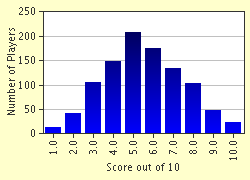Quiz Answer Key and Fun Facts
1. Firstly, to which of these language groups does English belong?
2. In the sentence 'I took my big brown cat to the vet yesterday', which of the following does *not* appear?
3. True or false: English has no inflections for grammatical case.
4. What is defined as 'the study of sentence structure'?
5. Three of these languages do not have definite articles. Which one does have a structure that serves the purpose of a definite article?
6. In dialectology, what is the line on a map called which divides areas with different forms of a word?
7. The sounds of a language change over time. English spelling does not always reflect this change: how was the 'gh' in 'night' originally pronounced?
8. Which of these words describes the changing of the form of a verb in order to reflect person, number, tense and mood?
9. The combination of sounds 'ms-' is not acceptable as the beginning of a word or syllable in English. In which of these languages is it acceptable?
10. And finally... Old Norse is almost the same as which modern Scandinavian language?
Source: Author
Matve
This quiz was reviewed by FunTrivia editor
coolupway before going online.
Any errors found in FunTrivia content are routinely corrected through our feedback system.

